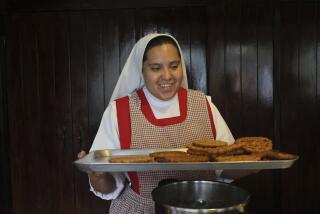Catholics Not Wedded to Practice of Tithing
- Share via
Tithing -- the response to the biblical exhortation of returning to God 10% of his gifts -- may be common in some denominations, but in most American churches it remains a rare practice.
Researchers have found that although about 80% of Americans profess to be Christians, and many say they believe in tithing, consistent tithers are a small group -- about 3% of adults.
Modest tithing is especially noticeable among Roman Catholics, who give to their parishes about half as much as Protestants. In 2003, Protestants gave 2.6% of their income to their churches and Catholics gave 1.2%, according to studies conducted by Empty Tomb Inc., a Christian research and service group based in Champaign, Ill.
Why?
One reason -- researchers, clergy and parishioners say -- is that Catholics simply don’t have a tradition of tithing and annual pledging.
Angela Lee, a member of St. Cyril of Jerusalem Church in Encino, said many Catholics continue to drop $1 in the offering basket, as they did 30 years ago.
Msgr. Carl Bell, pastor of St. Cyril of Jerusalem, said he once heard a bishop describe the state of giving in the Catholic church as something like this: If you have $50, you go out to dinner. If you have $20, you go to a movie. If you have $10, you get fast food. But if you have $1, you go to church.
A lack of tradition isn’t the only reason for a scarcity of tithing, experts say. The avoidance of tithing reflects the sense of ownership parishioners feel toward their churches -- or more precisely, the lack of it.
“The heritage in Catholic thought that still hangs over people is that they are just customers and the clergy really owns the church,” said Dean R. Hoge, a professor of sociology at Washington, D.C.’s Catholic University of America, whose specialty is churches.
That view, combined with the large size of parishes, makes it hard for most members to think they can make a difference, said Hoge, a co-author of “Money Matters: Personal Giving in American Churches,” a seminal work on church giving.
“It’s almost like we just go there; we don’t own the store,” said Hoge, whose research team surveyed 625 congregations in five mainline denominations across the nation. He said many Catholics think “the priest will give us what we need, and we’ll tell him what we want.”
On the other hand, in smaller Protestant churches where tithing is a tradition, congregants encourage each other to give.
“You have lay leadership that says ... ‘Dear friends, we’re going to have to pay a little more. Otherwise, we can’t keep this church going. It’s our church,’ ” Hoge said.
The average Catholic parish has about 3,100 people -- 10 times its Protestant counterpart. Parishes in Los Angeles tend to be even bigger.
St. Cyril of Jerusalem has 1,400 members, but Bell is reluctant to ask his congregants to tithe.
“It’s awkward to talk about money,” Bell said. “I am not a fundraiser.”
Besides, he added, so many young couples in his parish are struggling to pay mortgages.
Appeals for money at Bell’s church are subtle. The church provides Sunday offering envelopes with “offertory giving suggestions: 10% of take-home pay; 5% directly to the parish; 5% to the poor and other charities.”
The front side of the white envelope has a drawing of Christ with outstretched arms, with a quote from Psalm 116: “What return can I make to the Lord for all His kindness to me?”
A box on the envelope helps parishioners calculate 5% donations, listing weekly incomes from $300 to $2,000 and the corresponding gift.
“It’s helpful,” said Lee. “Though priests don’t tell parishioners they should tithe, I think the Catholic church is paying more attention to this.”
There are a number of references to tithing in the Old Testament.
For example, Leviticus 27:32 says: “And concerning the tithe of the herd, or of the flock, even of whatsoever passeth under the rod, the tenth shall be holy unto the Lord.”
Many Protestants, especially Evangelicals, interpret tithing as giving 10% of their income to their home church. Contributions to other charities must be above and beyond what they give their church.
But in the Catholic Church, what constitutes tithing is subject to debate.
“Strictly speaking, tithing is 10%, but I also think tithing is giving one’s talents, time and effort,” said Norma Habunal, a member of St. Basil’s Catholic Church on Wilshire Boulevard in Wilshire Center/Koreatown.
Habunal, a retired Compton teacher who attends Mass every day, said she could not afford to give 10%. Instead, she makes in-kind contributions by volunteering at the church.
Tithing is biblical but not mentioned in the New Testament, said Msgr. Robert Gallagher, pastor of St. Charles Borromeo Church in North Hollywood.
“Jesus did not tell anyone, ‘You have to give 10%,’ ” Gallagher said. But he was clear about looking after the poor and needy, he added. “If those are the people Jesus dwells with, we have an obligation to join him in dwelling with them.”
At St. Charles Borromeo, 60 to 70 volunteers, most of them retirees, operate a service center that helps the homeless and poor of North Hollywood, he said.
That’s tithing too, he said.
“In many parishes, we are still trying to foster that sense of involvement, not only in the various ministries of the church but in the habit and practice of giving,” said Tod Tamberg, a spokesman for the Los Angeles Archdiocese. “People are more inclined to give when they know what it is going for.”
Hoge agrees.
He said one of the most financially successful Catholic parishes in the country was St. Francis of Assisi Catholic Church in Wichita, Kan., where tithing is an ingrained part of the church’s culture.
“They keep a list of tithers,” Hoge said. Tithers get extra privileges, such as not paying parochial school tuition.
“They are God-fearing people who believe in what the church is doing,” he said.
Msgr. Clement J. Connolly, pastor of Holy Family Church, a parish of 5,000 families in South Pasadena, offers a broad view of tithing.
“A lot of people think tithing has to do with money,” Connolly said. “I think it’s far larger.... I do think the important thing about giving is it should never be separated from way of life -- their reverence for the presence of God in all things.”
*
Religious giving
Some denominations require tithing -- giving 10% of one’s gross income to a church -- but others encourage other forms of giving.
* Catholic: Many Catholic parishes recommend that their parishioners give 5% of their income to their church and 5% to the poor and other charities.
* Protestant: Many Protestant churches strongly encourage, but do not require, congregants to tithe.
* Jewish: Jews support synagogues with membership dues as well as additional donations.
* Buddhist: Buddhism encourages almsgiving to Buddhist monks, nuns, teachers and the needy.
* Mormon: Mormons are required to tithe.
* Muslim: Muslims have a religious donation known as zakat, amounting to 2.5% of their assets, for the poor and other needy people listed in the Koran.
*
Los Angeles Times
More to Read
Sign up for Essential California
The most important California stories and recommendations in your inbox every morning.
You may occasionally receive promotional content from the Los Angeles Times.










